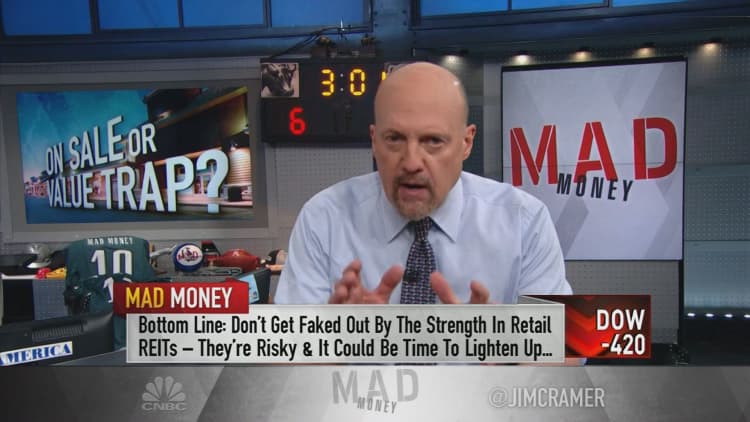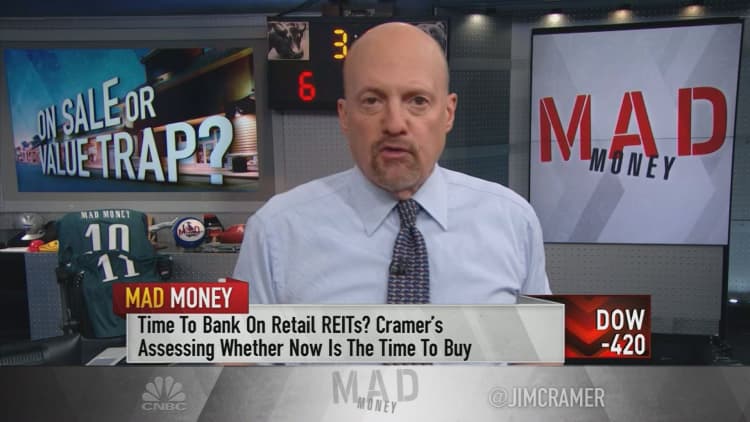
On a rough day for the stock market in which the Dow Jones industrial average plunged nearly 600 points, CNBC's Jim Cramer noticed one stock group trading surprisingly well: retail-focused REITs, or real estate investment trusts.
Retail REITs became some of 2017's worst-performing equities as the underlying companies fell under pressure amid waves of store closings. But their stocks weathered Thursday's drop.
"I feel compelled to come out here tonight and tell you ... that you should not be misled by this rally," the "Mad Money" host said on Thursday. "You need to be able to tell the difference between a sustainable rally and a brief bounce on the way down."
"The mall-based real estate investment trusts are simply not the kind of stocks you want to own in this environment and you need to use any strength, even relative strength like you're getting at this particular opportunity, to start selling them," Cramer said.
Cramer's reasoning had to do with interest rates. While he stressed that homegamers shouldn't get too caught up in whether the 10-year Treasury, a benchmark for bonds, yields 2.8 percent or 3 percent, he acknowledged that its upticks could threaten REITs.
With steady growth and high dividends, REITs represent bond market equivalents. That means that when bond yields rise and make bonds more attractive investments, REITs can get clobbered.
The "Mad Money" host added that the overall trajectory of the bond market wasn't exactly favorable to high-yielding plays like REITs.
"Long-term interest rates must head higher — must — because we've got a booming economy, ... and short-term rates are going up as the Fed gradually tightens three or four times this year," Cramer said. "As that process unfolds, the REITs will continue to get blasted, particularly the mall-oriented REITs, as we still have too many retail outlets in this country."
Cramer called attention to the 13 biggest publicly traded retail-focused REITs: Simon Property Group, GGP, Regency Centers, Federal Realty, Macerich, Kimco Realty, Brixmor Property Group, Weingarten Realty, DDR, Kite Realty, Tanger Factory Outlet Centers, Washington Prime, CBL & Associates and PREIT.
On the whole, especially compared to the performance of the broader market, these stocks have struggles since their peaks in 2016, down an average of 45 percent from their highs. In the past few weeks, however, the group has bounced an average of 10.2 percent, with the biggest rebounds generally coming from the worst performers, Cramer noted.
"But even the best-run shopping center REITs ... like Federal Realty and Tanger are tough to own," he said. "It's not just that these are broken stocks, hurt by the long-term resurgence in interest rates. They're also potentially broken companies."
The reason behind this is a trend that has spooked the retail industry for months: the decline of malls and shopping centers and the concomitant rise of online shopping.
Credit Suisse predicted in 2017 that between 20 and 25 percent of U.S. malls would close within five years; Cramer cautioned that even a less bearish estimate of 10 percent would wreak havoc on the industry.
But as consumers increasingly turn to e-commerce, the number of malls in the United States has not decreased. Instead, more are built each year, in part because of generous incentives that municipalities offer to companies to build in their areas, Cramer said.
"In short, we're still over-stored in America and this is not a good business to be in," he said.
Still, he acknowledged the bullish side of the debate: as retail REITs' stocks decline and their yields rise, won't there be a point where the stocks will be too attractive to avoid?
"That's actually the crux of the issue," Cramer said. "With the decline of brick-and-mortar shopping, what happens to the retail real estate investment trusts if they do need to slice their dividends? You know what happens? The stocks get obliterated, that's what."
Dividend cuts aren't on the horizon for most of these companies just yet. But if they are unable to fill vacancies or are forced into charging lower rents, it could happen, Cramer warned.
The "Mad Money" host said one way for these REITs to avoid long-term pain is to diversify away from retail, like Federal Realty has done. As property values decline, other escape plans like going private simply become less realistic, he said.
"Here's the bottom line: don't let the recent strength in real estate investment trusts fake you out," Cramer concluded. "This is still a very risky group to own, and as interest rates start climbing again, these stocks will go right back down. Maybe this is a chance to lighten up. Remember, we don't like reaching for stocks with super-high yields in Cramerica because they're often a sign that the underlying dividends may turn out to be very risky in the future."
WATCH: Cramer issues a warning about retail REIT stocks

Questions for Cramer?
Call Cramer: 1-800-743-CNBC
Want to take a deep dive into Cramer's world? Hit him up!
Mad Money Twitter - Jim Cramer Twitter - Facebook - Instagram - Vine
Questions, comments, suggestions for the "Mad Money" website? madcap@cnbc.com



